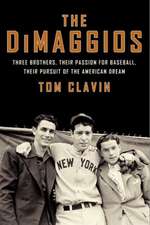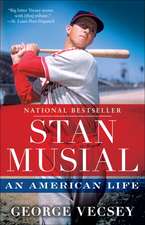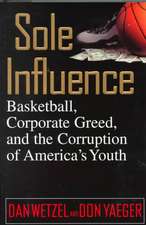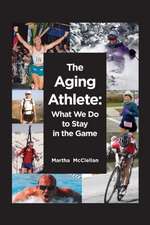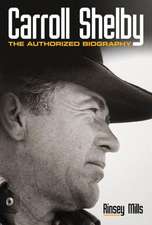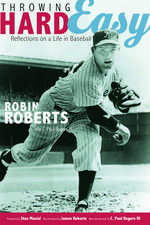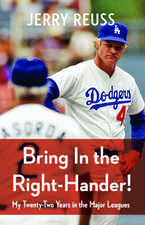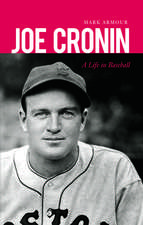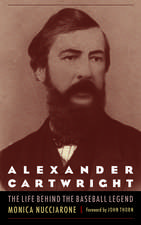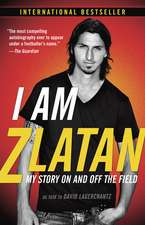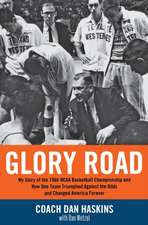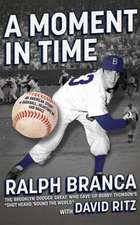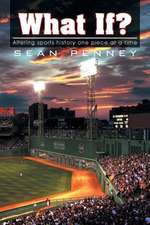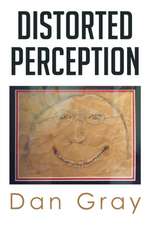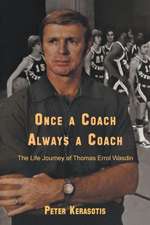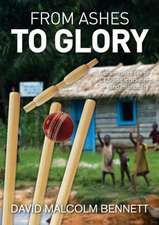Resilience
Autor Alonzo Mourning, Dan Wetzelen Limba Engleză Paperback – 31 aug 2009
By sharing his experiences of the chasms and peaks of illness and recovery, Mourning delivers a message of faith and fire, trust and triumph. Resilience is a story of both meaningful everyday lessons and the things, great and small, that truly matter in life.
Preț: 105.63 lei
Nou
Puncte Express: 158
Preț estimativ în valută:
20.21€ • 21.61$ • 16.85£
20.21€ • 21.61$ • 16.85£
Carte disponibilă
Livrare economică 27 martie-10 aprilie
Preluare comenzi: 021 569.72.76
Specificații
ISBN-13: 9780345507501
ISBN-10: 0345507509
Pagini: 272
Ilustrații: 16-PG B/W PHOTOS ON TEXT STOCK (CONVERTED FROM COLOR INSERT)
Dimensiuni: 132 x 203 x 15 mm
Greutate: 0.21 kg
Editura: ESPN Video
ISBN-10: 0345507509
Pagini: 272
Ilustrații: 16-PG B/W PHOTOS ON TEXT STOCK (CONVERTED FROM COLOR INSERT)
Dimensiuni: 132 x 203 x 15 mm
Greutate: 0.21 kg
Editura: ESPN Video
Notă biografică
Alonzo Mourning was a seven-time NBA all-star and a two-time Defensive Player of the Year during his eleven-year career. He won a gold medal for the United States at the 2000 Olympics and an NBA championship with the 2006 Miami Heat, where he is that franchise’s all-time leading scorer. He was also a three-time All America at Georgetown, where he earned a degree in sociology. Mourning is a national spokesman for the National Kidney Foundation and operates Alonzo Mourning Charities, including Zo’s Fund for Life. He, his wife, and their two children live in Coral Gables, Florida.
Named “America’s Best Sports Writer” in 2006 by Salon.com, Dan Wetzel is an award-winning columnist for Yahoo! Sports, the most read sports site on the Web, and is a regular guest on sports radio shows around the country. He is the co-author of three books, including Glory Road (with Don Haskins), which became a major motion picture.
From the Hardcover edition.
Named “America’s Best Sports Writer” in 2006 by Salon.com, Dan Wetzel is an award-winning columnist for Yahoo! Sports, the most read sports site on the Web, and is a regular guest on sports radio shows around the country. He is the co-author of three books, including Glory Road (with Don Haskins), which became a major motion picture.
From the Hardcover edition.
Extras
THE WAKE- UP CALL
The kid wouldn’t eat. Not a bite. There was nothing his father could do. Doctors, nurses, and even fellow patients tried and got nowhere. For almost two weeks, no food. “I think he was giving up,” said Brian Mossbarger of his ten-year- old son, Zach. Of all the setbacks in a lifetime of setbacks, this was the most crushing for the father to watch.
And this from a dad who found Zach unresponsive at the tender age of three weeks old, rushed him to a small- town Ohio hospital, had doctors set up a medical helicopter to a bigger facility in Toledo, and was told, brutally, “Don’t expect him to survive the airlift.”
Zach did survive, but his was a difficult life. He was in and out of hospitals, doctor after doctor, treatment after treatment, surgery after surgery, infection after infection. One thing and then another; every solution brought a new problem. He suffered from chronic kidney failure, and by the age of eight the self- conscious boy had scars all over his body and two six- inch tubes coming out of his neck to serve as a temporary catheter; then, at nine, he started regular dialysis. The schoolkids were predictably cruel.
Eventually doctors settled on a transplant. Brian, thirty- five, a tough machine repairman at an aluminum factory, was a perfect match. The transplant took place on Valentine’s Day, 2007, at the University of Michigan hospital. For nine days, the kidney worked. Then it didn’t. Vascular rejection, the doctors said; the worst possible kind.
And so Zach stopped eating. Doctors had to tube- feed him. “He thought the transplant would be it for him,” Brian said. “When it didn’t happen, he was really depressed.”
No one knew what to do, what to say. In a small- world way, they found someone who might. Brian’s older brother worked with a guy who knew another man whose mother, Shari Rochester, was Alonzo Mourning’s assistant. The story got to Shari and she told Alonzo, told him about the vascular rejection, about the not eating. Alonzo said, “I have to meet this kid.”
The Miami Heat were scheduled to play at the Detroit Pistons in a few days. Alonzo set it up so Zach, who hadn’t left the hospital in six weeks, and Brian could visit him at the game. A doctor came along, just in case. On April 1, outside the Detroit visitors’ locker room just before the game, they wheeled small, frail Zach in front of big, strong Alonzo, two transplant survivors, two kidney patients sharing a look of mutual understanding and respect. Then Alonzo knelt down and flexed one of his massive biceps at the awestruck kid.
“You want some of these, you’ve got to start eating,” Alonzo said. “I had a transplant too, and look at me.”
They talked some more. Took pictures, signed autographs, and exchanged phone numbers. Then Zach got wheeled out to courtside seats and stunned everyone.
He asked his dad for a hot dog.
A hot dog? Yes, the boy needed to eat, but something as nutritiously empty as a stadium hot dog? The doctor shrugged. “Go for it. It’s something.” Brian got Zach a hot dog. Then a half hour later Zach asked for nachos. A large order, no less. Brian got Zach nachos.
Back at the hospital everything seemed to change. The kid ate. The kid smiled. The kid started thinking positive.
“He had been so down,” Brian said. “Then it all changed.”
Three weeks later, doctors tested his creatinine level–the key stat for all kidney patients, where the lower the number the better. Zach had been hanging around a too- high 2.1. The test came in at 1.6, an incredible improvement. Unbelievable, really. So they tested again. The creatinine was 1.6. Again. Over a month after rejection, was this kidney finally working?
Dumbfounded, the doctors huddled and decided to push the issue. They took Zach off dialysis, just to see. The next day he registered a 1.1. The next 0.8, normal for him. No one knew how it could have happened. Within days, Zach was out of the hospital.
“I’m not real religious,” Brian said. “But one of the things Alonzo kept saying was ‘Pray for it and everything will come out the right way.’
“How do you thank a guy like that, who has no clue who you are but steps into your life and helps out, calls, prays, offers advice and hope? What can I say about him?”
Brian said this from the side of a fishing hole in northwest Ohio, his old kidney going strong in his son’s body. Dusk was coming fast and father and son were having a long, carefree time. The ten- year- old boy looked like any ten- year- old boy, laughing and jumping around as he caught a bass.
“You just have to stay positive and believe and never lose hope,” Brian said. “That’s what I’d tell other parents. That’s what Alonzo kept telling me.”
With that he went and unhooked his son’s fish.
Your life can change in a single instant, at the most unexpected time in the most routine manner. One second you have a list of concerns and challenges and plans to deal with. The next second that all seems trivial and God is laying down a challenge–a challenge you never saw coming.
Mine came courtesy of a ringing telephone while I was asleep. I was taking a rare midday nap. Unless it was a game day, I was the last guy to spend the afternoon sleeping, especially with another NBA season to prepare for. But I was exhausted, suffering from what I believed was a combination of a lingering flu and extreme jet lag.
At my doctor’s suggestion I had gone in for some medical tests, a precautionary biopsy, but I didn’t believe anything serious was wrong, maybe a thyroid condition, or a virus. Maybe I was just ignoring the signs, but I really wasn’t very concerned. At worst, I figured, I’d take some pills and get back to getting ready for the fast- approaching NBA season, one in which I had my eyes on winning the championship. After all, I was the healthiest person I knew–thirty years old, six foot ten, 255 pounds with just six percent body fat. I benched over three hundred pounds with ease. I worked out with hundred- pound dumbbells. I was a professional athlete, coming off a season where I was first team All NBA, a runner-up for NBA Most Valuable Player. That summer I had been named USA Basketball Player of the Year after we won gold at the Sydney Olympics. With defense as my specialty, my reputation as a player was as perhaps the toughest and hardest- working one in the entire league.
At that point, in September of 2000, I felt invincible, like I could leap tall buildings. Nothing ever fazed me. I kept telling myself, even after my doctor had suggested those tests, that I was just under the weather, the understandable fallout of recent events in my life. A grueling NBA season had led straight into summer with the Olympic team. With Dream Team IV, I had toured Asia before hitting Australia for the Olympics. At the same time, life at home was blessed but hectic.
My wife, Tracy, was pregnant with our second child, and part of the deal I made with her was that I could fulfill my dream of being an Olympian as long as I promised to make it back for the birth. I tend to push things and believe everything will work out, so we had looked at the Olympic basketball schedule, found a couple of open days and decided to have the labor induced on a Saturday right in the middle of the games. That way, I could fly back to Miami with my mother- in- law and my first son, Trey, be at the birth, and then fly back to Australia and not miss a single game. USA Basketball was on board with the plan and NBC was even going to send a camera crew along. Nothing makes for great television like a new baby. It was all set.
But two days before the induction, the baby decided to come anyway. My wife started feeling labor pains and was in the shower singing to her, “Baby girl, wait for Daddy. Wait for Nana and your big brother.” By the time she got out of the shower, though, she knew she couldn’t wait. She called me and said, “Look, it’s time; it’s coming.” I dropped everything. We grabbed the next flight from Sydney to Los Angeles– fourteen hours in the air–and then jumped on a plane from L.A. to Miami, which is six more hours. The trip from L.A. came on the private jet of the owner of the Miami Heat; if he hadn’t been so gracious, we probably wouldn’t have made it.
That trip seemed to take forever. The last few hours, my wife was in the delivery room still singing to the baby to “wait for Daddy, wait for Daddy,” but it was getting close. Tracy’s sister, Lisa, was at the hospital, and in between contractions she was staring out the window looking for us to pull up. She finally said, “I see a limo, they’re here!” I went racing up and my wife was just bawling because she couldn’t believe we had made it, and within half an hour Myka Sydney–named after the town hosting the Olympics–was born. It was one of the greatest moments of my life, holding this little baby girl in my big hands and gaining that immediate love that only being a parent can provide. I was so overwhelmed I forgot to even be tired.
Talk about a whirlwind. I have so much faith in God, I never worried that I would miss the birth. It seemed perfectly reasonable to me that I arrived from the other side of the world, camera crew in tow, with twenty- five minutes to spare. That’s the mentality I had, the trust I had in God. We all spent a great night together and then, less than twenty-four hours after reaching Tracy, I headed back to Australia where I arrived just in time for the medal rounds. I was exhausted but managed to play well. We won the gold, and my lifelong dream was fulfilled.
I returned to Miami and a house with a newborn, which isn’t conducive to sleeping off jet lag. All things considered, I kept telling myself, I had every right to be tired.
I was being naïve, of course. This was more than jet lag. The truth is I had been fatigued all summer. I was fidgety and my muscles were taking on more water than usual. One day at the Olympics I was getting stretched out and my leg looked swollen. I pushed into the leg and it left an indentation. I said to the trainer, “What the heck is this?” He told me I needed to get it checked out. But still, I was so unconcerned I never even told Tracy about it. She was busy with the baby, anyway, and I just thought, this is nothing.
Back in Miami, I wasn’t feeling any better. I decided I just needed a good workout. This is how I had always attacked the problems in my life. Whatever obstacle was in front of me, I would work right through it. I would just train harder or push harder until I beat it. I had been injured countless times as a professional basketball player and this approach had always worked for me. I went to the Miami Heat facility and put in a grueling four hours. I lifted weights, ran sprints, did a whole bunch of stuff. I thought, “I just need to sweat it out.” I thought whatever was wrong would be just another thing I could ice down and wrap up. Of course, the workout only made me sicker, because my immune system was shot.
Later that day, on the way to the hospital for the tests–my agent, Jeff Wechsler, was driving me–I passed out in the passenger seat. I had a temperature of 104. I was very weak and depleted. But it still didn’t dawn on me how sick I was. I wouldn’t allow myself to admit it. I had training camp coming up and I knew the physical challenges ahead would be brutal. Which is why the voice of my doctor, Victor Richards, on the phone the next day made me sit up in my darkened bedroom. He said he had my test results and without hesitation he unloaded it on me.
“Alonzo, your creatinine level is pretty high,” he said. Before I could even remember whether that was a good or bad thing (I thought it was bad), he said, “You have a rare disease called focal glomerulosclerosis.”
I was stunned. I didn’t understand what he was saying except that something with as many syllables as “focal glomerulosclerosis” couldn’t be good. Having played competitive basketball since I was a teenager, I had spent years around doctors and trainers, and I’d either experienced, or seen teammates experience, countless surgeries, medical treatments, injuries, and general ailments. Never had I heard of focal glomerulosclerosis.
“What did you say?” I asked. “What do I have?”
“You have a kidney disease called focal glomerulosclerosis,” Dr. Richards said. I was completely awake now.
“Am I going to die?” I asked.
“You’re going to be okay.”
“Well, will I be able to play basketball again?”
“That’s up to you.”
“There’s a cure for this, isn’t there?”
“No.”
He might as well have hit me with a baseball bat. No cure? What did that mean? I remember dropping my head into my hands; I was trying to grasp it all. Had Richards really just said there was no cure for this disease I had never heard of? If there was no cure, how was it up to me to play basketball? What would I tell my wife? What would I tell my son? What would I tell my baby girl? Would I ever be able to play with them and watch them grow up? And how could–of all things–my body, my strength, my health, the one thing that never let me down, now be called into question?
At the same time, everything was moving so fast and so slow; my mind was racing while my stomach was churning.
“You’re going to need a kidney transplant,” Dr. Richards continued.
This guy was incredible. He just kept coming with the bad news. A transplant?
“Ten to twelve months you’ll be on dialysis and you’ll be up for transplantation.” At this point, I didn’t even know what Dr. Richards was going to say next; he was just lobbing SCUD missiles in on me, and I was just taking them. One minute ago I had been convinced I had the flu; I thought I just needed a long nap.
“Dialysis?” I said. “What is dialysis?” I was just freaking out. Dialysis seemed like something for old people. Victor was trying to explain but all I could think was Transplant? Did he say ‘transplant’?
Dr. Richards said, “Well, you know we’re probably going to have to interview some family members and you might need another kidney.”
Another kidney? Obviously that is what a transplant entails, but it takes on a completely new meaning when you hear it said about your own body. Another kidney? Someone else’s kidney? In me?
I didn’t know what to say to Dr. Richards. I didn’t even try. He had just laid it out, painfully honest. I actually appreciated that; I’d rather know up front. He finally said he wanted me to come in and discuss the situation further. I thanked him, hung up, and put my head back in my hands. I had a whole bunch of stuff going through my head now. I didn’t cry, not one tear, although little did I know tears would come in buckets as this process played out.
Instead I just sat there thinking. This was so out of nowhere, so impossible to imagine. I thought the biggest challenge that coming year would be juggling the sleepless nights that come with a newborn while battling Shaquille O’Neal and Tim Duncan and pushing the Miami Heat to the NBA Championship.
Now points and rebounds were about to become secondary to hemofiltration and leukocyte antigens.
Not that I knew those words yet.
Less than a minute after I hung up the phone, Tracy came to check in, and after one look at me sitting on the edge of the bed with my head down she knew something was terribly wrong. I had probably never sat that way in my entire life. I was the kind of person who attacked everything head on. All great athletes are–no secret there. When challenged, you fight. When that isn’t enough, you fight harder.
When I was growing up, my family and I lived in a rural section of Chesapeake, Virginia; I was an only child until I was eleven, when my sister was born. We were working class. My father was a machinist at a local shipyard, and my mother worked a number of different jobs. When I was ten, my parents’ marriage began to deteriorate, and eventually they divorced. In the interim, life at home became very difficult, very emotional.
It wasn’t the worst situation in the world, and my parents were both great people, but the atmosphere was not good for me. Emotionally, I began acting out. I wasn’t normally a bad kid; I was actually a good kid. But all of a sudden I was in trouble all the time, and it was obvious, even to me, why that was happening. My parents and I went to a counseling session at the department of social services and that’s when I asked to be put into a group home for a while. My parents reluctantly agreed.
Once I was in the group home, I saw kids with real problems, the kind that made mine seem like nothing. The place actually had a room with padded walls. There was a restraining chair and I witnessed hauntingly disturbing outbursts. But I still didn’t want to go home. So I asked the state to put me into foster care, as crazy as that sounds. Just because I wasn’t in the worst situation didn’t mean my parents’ place was a good one. In the end, I got very lucky: I wound up with a woman named Fannie Threet, a local hero who as a foster mom helped raise forty- nine kids in Chesapeake. I was one of those children. Although things with my parents calmed down and with split custody they did a fine job raising my sister, Tamara, I never left foster care and never returned to live with either of them. Despite my youth, I knew Mrs. Threet’s house was the best place for me.
I am close with both my parents to this day, but I still call Ms. Threet “Mom” too. As an adult and a parent, I look back and realize it was a courageous thing for a ten- year- old to do, to realize that I needed a change, seek it out, and then make a leap of faith that it would work, but that was just me. That’s how I approached everything in life, with the attitude that there is a solution to every problem as long as you don’t fear the path to the solution.
That mentality has helped me my entire life. It got me out of that home environment and eventually out of Chesapeake. By maximizing my athletic abilities, by assuring that I used basketball rather than having basketball use me, I earned a full scholarship to Georgetown University. And once I was there, that drive got me academically through one of the elite schools in the country.
I wasn’t your typical Georgetown student. Most of the kids came from upper- class families; I came from foster care. Most of my classmates had attended fancy college prep schools; I just went to regular public school in Chesapeake. Most of them had two parents who graduated from college, if not graduate school. I was the first person in my entire family to get a diploma. I just wasn’t as prepared as they were. But as long as I worked on my studies, I could succeed also. At one point at Georgetown I was coasting, concentrating on basketball a little too much, and my coach, John Thompson, challenged me. It wasn’t that I was failing or anything; my grades were good. But he called me out on my effort, said I was more intelligent than I was showing people, which is a shameful way for a young man to act. He was correct. So I buckled down and made the dean’s list that semester. Just work harder, that was always my solution.
It’s also the way I play basketball. I am a big man by general standards, but in the NBA, I often gave up four or five inches and sometimes fifty to seventy pounds to other players, guys like Shaquille O’Neal, my seven- foot- one, 350- pound chief rival and later teammate, and the man who was picked first in the 1992 NBA draft, one spot ahead of me. Throughout my career I have prided myself on being an undersized center who can beat players bigger and stronger than me. I wasn’t the most naturally gifted player, and there were guys my size who had offensive skills I didn’t, so I needed to outwork them.
There were times when as soon as the game was over, rather than go home or out with the guys, I’d head directly for the weight room. I’d still have my game jersey on as I lifted weights and pushed myself. I always knew that I had to stay one step ahead of the competition in order to compete. I had to work just that much harder. They have a lot of rules in basketball and in life, but there is no rule that prohibits preparation. No one ever says you can’t work harder to be better prepared.
The result wasn’t just physical, either. It was mental. When you’ve prepared harder than everyone else, it instills confidence. I developed a psyche that said, You know what, they’re not here after the game lifting extra weights. They’re going to shower up and go home, but I’m going to go in and put in another hour.
That just get it done mentality was something I established at a young age, and like a wave it’s carried me all the way through. Whatever difficulty I met, I always believed if I faced it with a certain level of intensity and focus and determination, I would come out on top. Strength is not just physical, it is mental. And if you are mentally strong you can accomplish anything.
So when Tracy saw me like that–silent, worried, head down–she knew there was a major, major problem. She knew this was not me, that I must have just been hit with something greater than I had ever confronted. I told her what Dr. Richards had said. No cure. Dialysis. Transplant. Retirement. Understandably, she started crying. She described her immediate reaction as being like a wounded animal’s. She just assumed the worst: that I was going to die. I don’t blame her–the poor woman had just given birth, and now this comes along? Although I understood, crying was the last thing I wanted. My entire life, I never wanted people making a big deal about me.
When there was something wrong with me, some challenge, I always wanted to take it on myself. I’m the most independent person in the world. As a husband and a father, I am very protective of my family. I am the one who helps them, who protects them and worries about them. I can’t handle being on the other side.
As I sat on the edge of that bed, my wife standing over me crying, I leaned in, put my head on her stomach and we hugged for a minute. I was supporting her as much as she was supporting me, which is the only way families can get through things like this. Serious illness doesn’t just affect the afflicted.
I got Tracy to stop crying and asked her to be positive and strong for me. And she did. I decided right then and there that there would be no more feeling bad about the situation, because that wasn’t going to help solve the problem. Tracy also had an incredible life growing up; she was raised by a single mother who dealt with major racial discrimination. Later, when she asked her mother what to do, her mom
just said, “What would have happened to us if I had felt bad about things and given up?”
We were immediately determined to win this battle. That was the only way to approach it. There are often doubts in life, but you have to stand up and attack what is attacking you. Meet force with force. You have to learn as much as you can, come up with a plan, and be positive. “Hey,” I started to tell everyone, “I’m lucky. We have money and resources, the best health care options in the world. We’re blessed. I have a strong wife, a strong family, and strong faith. If anyone can handle this, we can. God always has a plan, and if this is his plan then let’s go.”
Focal glomerulosclerosis, I decided then and there, was going to somehow become the best thing that ever happened to me. God wouldn’t have given it to me if he didn’t want it to be that way. I just had to figure out how to make it so.
I said to Tracy, “Right now, we have to think about Plan B. We have to take this head-on.” I called my agent, Jeff, who doubles as one of my best friends, and told him the news, only to have him break down and start crying, too. Great, just what I didn’t need. I said, “Jeff, please. Come on, listen, we’ve already moved past this and we’ve got to think about our next step.”
Once Jeff had gathered himself, he said, “Well, first of all, we have to find the best kidney doctor in the world.” Now, that was the kind of stuff I was looking for. I said, “Let’s do it. Let’s go to him. Let’s find the best kidney doctor in the world.” So he mentioned that his father- in-law, Norman Braman, who was the former owner of the Philadelphia Eagles, knew someone who sat on the board of New York—Presbyterian Hospital. Jeff called Norman and Norman called his friend and his friend said that Dr. Gerald Appel in New York City was the guy considered to be the best, the most respected and most renowned in the world. We called him that day and it turned out he was about to head to Toronto to attend a convention with more than a thousand nephrologists. He told us to send him all my information and test results, and he would bring them to the convention. It was a true blessing, because the best nephrologists in the entire world were attending this convention, and when that box arrived the next morning Dr. Appel showed the case to them. God has a way with timing sometimes.
With focal glomerulosclerosis, once you rule out all of the possible causes such as HIV, drug abuse, and steroid abuse–which the doctors did–it is labeled a genetic disorder. They call it idiopathic, meaning they don’t know the cause. That’s part of the challenge. After seeing my lab results, Dr. Appel said he would come to Miami in a couple of days.
It was a crazy time. Word was leaking out that I was sick, and the newspapers were reporting all sorts of stuff. I was sure to retire. I was facing death. I had no chance of a normal life. So much of that wasn’t true. But we couldn’t control the media.
We set up a meeting at my house. I didn’t just want to rely on my doctors. I wanted a lot of bright people around who cared about me. So in addition to Dr. Appel, I asked Tracy, Jeff, Jeff’s colleague David Falk, Georgetown coach John Thompson, and my current coach with the Heat, Pat Riley, to attend. We all sat down around my dining room table so Dr. Appel could lay it out.
Dr. Appel is a very intelligent- looking guy. You know how some people just look intelligent? He is a little guy, with a mustache–he kind of looks like one of the Super Mario Brothers, from the video game. But he commands a lot of respect. So even though there were a lot of powerful people at the table, everyone sat still and listened to him. He was in charge. He said it flat- out: “Alonzo has to retire right now to deal with this.” He said I was carrying about twenty pounds of water weight and that my cholesterol measure was between 500 and 600. He couldn’t figure out how I managed to play basketball, let alone compete for an Olympic gold medal.
He said there were some positives, though. He thought there were ways to treat the condition that Dr. Richards hadn’t initially seen. He said, “There are certain new medicines that you could possibly respond to, so I’m going to try this particular regimen and we’re going to see how we can combat this. Maybe, just maybe, you won’t need a transplant. But you definitely have to retire right now.”
Even though he was saying I had to retire, I saw great hope in that diagnosis. That’s why it is so critical to get a second and third opinion. Less than a week earlier, Dr. Richards had said I would certainly need a transplant. That was a tough road for a number of reasons, not the least of which is that for a transplanted organ to work you generally need someone of similar height, stature, and weight. I’m almost six ten, and I weigh 255 pounds. You don’t just find people that size walking down the street. So the odds were already against me. For Dr. Appel to say that I might be able to live with my kidney was a real boost. For him to give me that little light at the end of the tunnel, for him to give me a little hope rather than just saying, “Hey, it’s over, you don’t have a chance of ever playing again,” meant everything.
After that initial moment of doubt in my bedroom, my attitude had never wavered. I was going to beat this. That was my only mentality. I had spent hours and hours on the Internet, learning everything I possibly could about kidney disease. I talked to every expert I could get on the phone. I began looking into holistic treatments–which I would later use–and natural cures. My entire focus was now on beating the disease, and I felt that if I put my mind to it, I would succeed. That was the attitude that had always worked for me, and that was what was going to get me through this. Resilience. I would be even more resilient than ever.
So that glimmer of hope was all I felt that I needed. I’m not sure if anyone else at the table was even aware of it–they were probably focused on the negative, the “Alonzo has to retire” part. But I was aware. I heard the message loud and clear. I just needed a chance. I was ready to do everything remotely possible to get myself physically right and make it happen.
It was a somber meeting, of course. Immediate retirement–that hurt, coming right in the prime of my career and on the eve of a season where an NBA Championship seemed possible. We agreed we should schedule a press conference, tell the world about my illness, and that I then should work toward either getting better or getting a transplant. It was a very matter- of- fact situation. These were the people who had always been there for me, who always had my best interests at heart, the ones I could trust. I had the best wife, the best agents, the best coaches, and the best doctor. Everyone agreed that this was the best path for me. And everyone agreed that my career was over.
Everyone, except, deep down, me.
Most people aren’t aware that I’m a very spiritual person. In general, I keep it to myself. For many people the name “Alonzo Mourning” con jures a big, scowling black man, a guy who grunts and hustles, blocks shots and grabs rebounds. It’s not a bad way to comport myself on the basketball court. My coaches and fans wouldn’t have been too happy if I turned the other cheek or paused for prayer every time Hakeem Olajuwon posted me up. Once or twice, it might have crossed my mind, though.
My faith is something that has sustained me through the highs and lows, through the mistakes I’ve made and even through some of the triumphs. There have been a fair share of both, but there was only one time in my life–during my illness–when that faith came into question.
As a professional athlete, I’d trained myself to power through, to never question my will to succeed. Resilience was a trait that served me well. But in the darkest days of this battle against kidney disease, it was tested like never before. I was still a large man in stature, but at times I was as weak and helpless as my newborn baby. That wasn’t a situation I could easily accept, and it rocked my faith in a way that, to me, was almost unimaginable.
But in the days, weeks, months, and years since then, that crushing moment became a sort of wake- up call, and I now realize how grateful I am for it. I had to come to terms with my faith in ways that I never would have, had I not gotten kidney disease. I had to take the deepest possible look at my life, acknowledge each and every weakness, each and every mistake, and come to the realization that just because faith is in your head, doesn’t mean it is in your heart.
I have been blessed with great teachers along the way. Family members, educators, coaches, doctors, and the Reverend Willie Alfonso served to restore that faith during my recovery. And there were others, too, who you’ll read about. God certainly works in mysterious ways. He puts you in situations to test your faith, and it can only grow stronger as you overcome these hurdles. From faith comes resilience.
Faith makes things possible.
But it doesn’t make them easy.
From the Hardcover edition.
The kid wouldn’t eat. Not a bite. There was nothing his father could do. Doctors, nurses, and even fellow patients tried and got nowhere. For almost two weeks, no food. “I think he was giving up,” said Brian Mossbarger of his ten-year- old son, Zach. Of all the setbacks in a lifetime of setbacks, this was the most crushing for the father to watch.
And this from a dad who found Zach unresponsive at the tender age of three weeks old, rushed him to a small- town Ohio hospital, had doctors set up a medical helicopter to a bigger facility in Toledo, and was told, brutally, “Don’t expect him to survive the airlift.”
Zach did survive, but his was a difficult life. He was in and out of hospitals, doctor after doctor, treatment after treatment, surgery after surgery, infection after infection. One thing and then another; every solution brought a new problem. He suffered from chronic kidney failure, and by the age of eight the self- conscious boy had scars all over his body and two six- inch tubes coming out of his neck to serve as a temporary catheter; then, at nine, he started regular dialysis. The schoolkids were predictably cruel.
Eventually doctors settled on a transplant. Brian, thirty- five, a tough machine repairman at an aluminum factory, was a perfect match. The transplant took place on Valentine’s Day, 2007, at the University of Michigan hospital. For nine days, the kidney worked. Then it didn’t. Vascular rejection, the doctors said; the worst possible kind.
And so Zach stopped eating. Doctors had to tube- feed him. “He thought the transplant would be it for him,” Brian said. “When it didn’t happen, he was really depressed.”
No one knew what to do, what to say. In a small- world way, they found someone who might. Brian’s older brother worked with a guy who knew another man whose mother, Shari Rochester, was Alonzo Mourning’s assistant. The story got to Shari and she told Alonzo, told him about the vascular rejection, about the not eating. Alonzo said, “I have to meet this kid.”
The Miami Heat were scheduled to play at the Detroit Pistons in a few days. Alonzo set it up so Zach, who hadn’t left the hospital in six weeks, and Brian could visit him at the game. A doctor came along, just in case. On April 1, outside the Detroit visitors’ locker room just before the game, they wheeled small, frail Zach in front of big, strong Alonzo, two transplant survivors, two kidney patients sharing a look of mutual understanding and respect. Then Alonzo knelt down and flexed one of his massive biceps at the awestruck kid.
“You want some of these, you’ve got to start eating,” Alonzo said. “I had a transplant too, and look at me.”
They talked some more. Took pictures, signed autographs, and exchanged phone numbers. Then Zach got wheeled out to courtside seats and stunned everyone.
He asked his dad for a hot dog.
A hot dog? Yes, the boy needed to eat, but something as nutritiously empty as a stadium hot dog? The doctor shrugged. “Go for it. It’s something.” Brian got Zach a hot dog. Then a half hour later Zach asked for nachos. A large order, no less. Brian got Zach nachos.
Back at the hospital everything seemed to change. The kid ate. The kid smiled. The kid started thinking positive.
“He had been so down,” Brian said. “Then it all changed.”
Three weeks later, doctors tested his creatinine level–the key stat for all kidney patients, where the lower the number the better. Zach had been hanging around a too- high 2.1. The test came in at 1.6, an incredible improvement. Unbelievable, really. So they tested again. The creatinine was 1.6. Again. Over a month after rejection, was this kidney finally working?
Dumbfounded, the doctors huddled and decided to push the issue. They took Zach off dialysis, just to see. The next day he registered a 1.1. The next 0.8, normal for him. No one knew how it could have happened. Within days, Zach was out of the hospital.
“I’m not real religious,” Brian said. “But one of the things Alonzo kept saying was ‘Pray for it and everything will come out the right way.’
“How do you thank a guy like that, who has no clue who you are but steps into your life and helps out, calls, prays, offers advice and hope? What can I say about him?”
Brian said this from the side of a fishing hole in northwest Ohio, his old kidney going strong in his son’s body. Dusk was coming fast and father and son were having a long, carefree time. The ten- year- old boy looked like any ten- year- old boy, laughing and jumping around as he caught a bass.
“You just have to stay positive and believe and never lose hope,” Brian said. “That’s what I’d tell other parents. That’s what Alonzo kept telling me.”
With that he went and unhooked his son’s fish.
Your life can change in a single instant, at the most unexpected time in the most routine manner. One second you have a list of concerns and challenges and plans to deal with. The next second that all seems trivial and God is laying down a challenge–a challenge you never saw coming.
Mine came courtesy of a ringing telephone while I was asleep. I was taking a rare midday nap. Unless it was a game day, I was the last guy to spend the afternoon sleeping, especially with another NBA season to prepare for. But I was exhausted, suffering from what I believed was a combination of a lingering flu and extreme jet lag.
At my doctor’s suggestion I had gone in for some medical tests, a precautionary biopsy, but I didn’t believe anything serious was wrong, maybe a thyroid condition, or a virus. Maybe I was just ignoring the signs, but I really wasn’t very concerned. At worst, I figured, I’d take some pills and get back to getting ready for the fast- approaching NBA season, one in which I had my eyes on winning the championship. After all, I was the healthiest person I knew–thirty years old, six foot ten, 255 pounds with just six percent body fat. I benched over three hundred pounds with ease. I worked out with hundred- pound dumbbells. I was a professional athlete, coming off a season where I was first team All NBA, a runner-up for NBA Most Valuable Player. That summer I had been named USA Basketball Player of the Year after we won gold at the Sydney Olympics. With defense as my specialty, my reputation as a player was as perhaps the toughest and hardest- working one in the entire league.
At that point, in September of 2000, I felt invincible, like I could leap tall buildings. Nothing ever fazed me. I kept telling myself, even after my doctor had suggested those tests, that I was just under the weather, the understandable fallout of recent events in my life. A grueling NBA season had led straight into summer with the Olympic team. With Dream Team IV, I had toured Asia before hitting Australia for the Olympics. At the same time, life at home was blessed but hectic.
My wife, Tracy, was pregnant with our second child, and part of the deal I made with her was that I could fulfill my dream of being an Olympian as long as I promised to make it back for the birth. I tend to push things and believe everything will work out, so we had looked at the Olympic basketball schedule, found a couple of open days and decided to have the labor induced on a Saturday right in the middle of the games. That way, I could fly back to Miami with my mother- in- law and my first son, Trey, be at the birth, and then fly back to Australia and not miss a single game. USA Basketball was on board with the plan and NBC was even going to send a camera crew along. Nothing makes for great television like a new baby. It was all set.
But two days before the induction, the baby decided to come anyway. My wife started feeling labor pains and was in the shower singing to her, “Baby girl, wait for Daddy. Wait for Nana and your big brother.” By the time she got out of the shower, though, she knew she couldn’t wait. She called me and said, “Look, it’s time; it’s coming.” I dropped everything. We grabbed the next flight from Sydney to Los Angeles– fourteen hours in the air–and then jumped on a plane from L.A. to Miami, which is six more hours. The trip from L.A. came on the private jet of the owner of the Miami Heat; if he hadn’t been so gracious, we probably wouldn’t have made it.
That trip seemed to take forever. The last few hours, my wife was in the delivery room still singing to the baby to “wait for Daddy, wait for Daddy,” but it was getting close. Tracy’s sister, Lisa, was at the hospital, and in between contractions she was staring out the window looking for us to pull up. She finally said, “I see a limo, they’re here!” I went racing up and my wife was just bawling because she couldn’t believe we had made it, and within half an hour Myka Sydney–named after the town hosting the Olympics–was born. It was one of the greatest moments of my life, holding this little baby girl in my big hands and gaining that immediate love that only being a parent can provide. I was so overwhelmed I forgot to even be tired.
Talk about a whirlwind. I have so much faith in God, I never worried that I would miss the birth. It seemed perfectly reasonable to me that I arrived from the other side of the world, camera crew in tow, with twenty- five minutes to spare. That’s the mentality I had, the trust I had in God. We all spent a great night together and then, less than twenty-four hours after reaching Tracy, I headed back to Australia where I arrived just in time for the medal rounds. I was exhausted but managed to play well. We won the gold, and my lifelong dream was fulfilled.
I returned to Miami and a house with a newborn, which isn’t conducive to sleeping off jet lag. All things considered, I kept telling myself, I had every right to be tired.
I was being naïve, of course. This was more than jet lag. The truth is I had been fatigued all summer. I was fidgety and my muscles were taking on more water than usual. One day at the Olympics I was getting stretched out and my leg looked swollen. I pushed into the leg and it left an indentation. I said to the trainer, “What the heck is this?” He told me I needed to get it checked out. But still, I was so unconcerned I never even told Tracy about it. She was busy with the baby, anyway, and I just thought, this is nothing.
Back in Miami, I wasn’t feeling any better. I decided I just needed a good workout. This is how I had always attacked the problems in my life. Whatever obstacle was in front of me, I would work right through it. I would just train harder or push harder until I beat it. I had been injured countless times as a professional basketball player and this approach had always worked for me. I went to the Miami Heat facility and put in a grueling four hours. I lifted weights, ran sprints, did a whole bunch of stuff. I thought, “I just need to sweat it out.” I thought whatever was wrong would be just another thing I could ice down and wrap up. Of course, the workout only made me sicker, because my immune system was shot.
Later that day, on the way to the hospital for the tests–my agent, Jeff Wechsler, was driving me–I passed out in the passenger seat. I had a temperature of 104. I was very weak and depleted. But it still didn’t dawn on me how sick I was. I wouldn’t allow myself to admit it. I had training camp coming up and I knew the physical challenges ahead would be brutal. Which is why the voice of my doctor, Victor Richards, on the phone the next day made me sit up in my darkened bedroom. He said he had my test results and without hesitation he unloaded it on me.
“Alonzo, your creatinine level is pretty high,” he said. Before I could even remember whether that was a good or bad thing (I thought it was bad), he said, “You have a rare disease called focal glomerulosclerosis.”
I was stunned. I didn’t understand what he was saying except that something with as many syllables as “focal glomerulosclerosis” couldn’t be good. Having played competitive basketball since I was a teenager, I had spent years around doctors and trainers, and I’d either experienced, or seen teammates experience, countless surgeries, medical treatments, injuries, and general ailments. Never had I heard of focal glomerulosclerosis.
“What did you say?” I asked. “What do I have?”
“You have a kidney disease called focal glomerulosclerosis,” Dr. Richards said. I was completely awake now.
“Am I going to die?” I asked.
“You’re going to be okay.”
“Well, will I be able to play basketball again?”
“That’s up to you.”
“There’s a cure for this, isn’t there?”
“No.”
He might as well have hit me with a baseball bat. No cure? What did that mean? I remember dropping my head into my hands; I was trying to grasp it all. Had Richards really just said there was no cure for this disease I had never heard of? If there was no cure, how was it up to me to play basketball? What would I tell my wife? What would I tell my son? What would I tell my baby girl? Would I ever be able to play with them and watch them grow up? And how could–of all things–my body, my strength, my health, the one thing that never let me down, now be called into question?
At the same time, everything was moving so fast and so slow; my mind was racing while my stomach was churning.
“You’re going to need a kidney transplant,” Dr. Richards continued.
This guy was incredible. He just kept coming with the bad news. A transplant?
“Ten to twelve months you’ll be on dialysis and you’ll be up for transplantation.” At this point, I didn’t even know what Dr. Richards was going to say next; he was just lobbing SCUD missiles in on me, and I was just taking them. One minute ago I had been convinced I had the flu; I thought I just needed a long nap.
“Dialysis?” I said. “What is dialysis?” I was just freaking out. Dialysis seemed like something for old people. Victor was trying to explain but all I could think was Transplant? Did he say ‘transplant’?
Dr. Richards said, “Well, you know we’re probably going to have to interview some family members and you might need another kidney.”
Another kidney? Obviously that is what a transplant entails, but it takes on a completely new meaning when you hear it said about your own body. Another kidney? Someone else’s kidney? In me?
I didn’t know what to say to Dr. Richards. I didn’t even try. He had just laid it out, painfully honest. I actually appreciated that; I’d rather know up front. He finally said he wanted me to come in and discuss the situation further. I thanked him, hung up, and put my head back in my hands. I had a whole bunch of stuff going through my head now. I didn’t cry, not one tear, although little did I know tears would come in buckets as this process played out.
Instead I just sat there thinking. This was so out of nowhere, so impossible to imagine. I thought the biggest challenge that coming year would be juggling the sleepless nights that come with a newborn while battling Shaquille O’Neal and Tim Duncan and pushing the Miami Heat to the NBA Championship.
Now points and rebounds were about to become secondary to hemofiltration and leukocyte antigens.
Not that I knew those words yet.
Less than a minute after I hung up the phone, Tracy came to check in, and after one look at me sitting on the edge of the bed with my head down she knew something was terribly wrong. I had probably never sat that way in my entire life. I was the kind of person who attacked everything head on. All great athletes are–no secret there. When challenged, you fight. When that isn’t enough, you fight harder.
When I was growing up, my family and I lived in a rural section of Chesapeake, Virginia; I was an only child until I was eleven, when my sister was born. We were working class. My father was a machinist at a local shipyard, and my mother worked a number of different jobs. When I was ten, my parents’ marriage began to deteriorate, and eventually they divorced. In the interim, life at home became very difficult, very emotional.
It wasn’t the worst situation in the world, and my parents were both great people, but the atmosphere was not good for me. Emotionally, I began acting out. I wasn’t normally a bad kid; I was actually a good kid. But all of a sudden I was in trouble all the time, and it was obvious, even to me, why that was happening. My parents and I went to a counseling session at the department of social services and that’s when I asked to be put into a group home for a while. My parents reluctantly agreed.
Once I was in the group home, I saw kids with real problems, the kind that made mine seem like nothing. The place actually had a room with padded walls. There was a restraining chair and I witnessed hauntingly disturbing outbursts. But I still didn’t want to go home. So I asked the state to put me into foster care, as crazy as that sounds. Just because I wasn’t in the worst situation didn’t mean my parents’ place was a good one. In the end, I got very lucky: I wound up with a woman named Fannie Threet, a local hero who as a foster mom helped raise forty- nine kids in Chesapeake. I was one of those children. Although things with my parents calmed down and with split custody they did a fine job raising my sister, Tamara, I never left foster care and never returned to live with either of them. Despite my youth, I knew Mrs. Threet’s house was the best place for me.
I am close with both my parents to this day, but I still call Ms. Threet “Mom” too. As an adult and a parent, I look back and realize it was a courageous thing for a ten- year- old to do, to realize that I needed a change, seek it out, and then make a leap of faith that it would work, but that was just me. That’s how I approached everything in life, with the attitude that there is a solution to every problem as long as you don’t fear the path to the solution.
That mentality has helped me my entire life. It got me out of that home environment and eventually out of Chesapeake. By maximizing my athletic abilities, by assuring that I used basketball rather than having basketball use me, I earned a full scholarship to Georgetown University. And once I was there, that drive got me academically through one of the elite schools in the country.
I wasn’t your typical Georgetown student. Most of the kids came from upper- class families; I came from foster care. Most of my classmates had attended fancy college prep schools; I just went to regular public school in Chesapeake. Most of them had two parents who graduated from college, if not graduate school. I was the first person in my entire family to get a diploma. I just wasn’t as prepared as they were. But as long as I worked on my studies, I could succeed also. At one point at Georgetown I was coasting, concentrating on basketball a little too much, and my coach, John Thompson, challenged me. It wasn’t that I was failing or anything; my grades were good. But he called me out on my effort, said I was more intelligent than I was showing people, which is a shameful way for a young man to act. He was correct. So I buckled down and made the dean’s list that semester. Just work harder, that was always my solution.
It’s also the way I play basketball. I am a big man by general standards, but in the NBA, I often gave up four or five inches and sometimes fifty to seventy pounds to other players, guys like Shaquille O’Neal, my seven- foot- one, 350- pound chief rival and later teammate, and the man who was picked first in the 1992 NBA draft, one spot ahead of me. Throughout my career I have prided myself on being an undersized center who can beat players bigger and stronger than me. I wasn’t the most naturally gifted player, and there were guys my size who had offensive skills I didn’t, so I needed to outwork them.
There were times when as soon as the game was over, rather than go home or out with the guys, I’d head directly for the weight room. I’d still have my game jersey on as I lifted weights and pushed myself. I always knew that I had to stay one step ahead of the competition in order to compete. I had to work just that much harder. They have a lot of rules in basketball and in life, but there is no rule that prohibits preparation. No one ever says you can’t work harder to be better prepared.
The result wasn’t just physical, either. It was mental. When you’ve prepared harder than everyone else, it instills confidence. I developed a psyche that said, You know what, they’re not here after the game lifting extra weights. They’re going to shower up and go home, but I’m going to go in and put in another hour.
That just get it done mentality was something I established at a young age, and like a wave it’s carried me all the way through. Whatever difficulty I met, I always believed if I faced it with a certain level of intensity and focus and determination, I would come out on top. Strength is not just physical, it is mental. And if you are mentally strong you can accomplish anything.
So when Tracy saw me like that–silent, worried, head down–she knew there was a major, major problem. She knew this was not me, that I must have just been hit with something greater than I had ever confronted. I told her what Dr. Richards had said. No cure. Dialysis. Transplant. Retirement. Understandably, she started crying. She described her immediate reaction as being like a wounded animal’s. She just assumed the worst: that I was going to die. I don’t blame her–the poor woman had just given birth, and now this comes along? Although I understood, crying was the last thing I wanted. My entire life, I never wanted people making a big deal about me.
When there was something wrong with me, some challenge, I always wanted to take it on myself. I’m the most independent person in the world. As a husband and a father, I am very protective of my family. I am the one who helps them, who protects them and worries about them. I can’t handle being on the other side.
As I sat on the edge of that bed, my wife standing over me crying, I leaned in, put my head on her stomach and we hugged for a minute. I was supporting her as much as she was supporting me, which is the only way families can get through things like this. Serious illness doesn’t just affect the afflicted.
I got Tracy to stop crying and asked her to be positive and strong for me. And she did. I decided right then and there that there would be no more feeling bad about the situation, because that wasn’t going to help solve the problem. Tracy also had an incredible life growing up; she was raised by a single mother who dealt with major racial discrimination. Later, when she asked her mother what to do, her mom
just said, “What would have happened to us if I had felt bad about things and given up?”
We were immediately determined to win this battle. That was the only way to approach it. There are often doubts in life, but you have to stand up and attack what is attacking you. Meet force with force. You have to learn as much as you can, come up with a plan, and be positive. “Hey,” I started to tell everyone, “I’m lucky. We have money and resources, the best health care options in the world. We’re blessed. I have a strong wife, a strong family, and strong faith. If anyone can handle this, we can. God always has a plan, and if this is his plan then let’s go.”
Focal glomerulosclerosis, I decided then and there, was going to somehow become the best thing that ever happened to me. God wouldn’t have given it to me if he didn’t want it to be that way. I just had to figure out how to make it so.
I said to Tracy, “Right now, we have to think about Plan B. We have to take this head-on.” I called my agent, Jeff, who doubles as one of my best friends, and told him the news, only to have him break down and start crying, too. Great, just what I didn’t need. I said, “Jeff, please. Come on, listen, we’ve already moved past this and we’ve got to think about our next step.”
Once Jeff had gathered himself, he said, “Well, first of all, we have to find the best kidney doctor in the world.” Now, that was the kind of stuff I was looking for. I said, “Let’s do it. Let’s go to him. Let’s find the best kidney doctor in the world.” So he mentioned that his father- in-law, Norman Braman, who was the former owner of the Philadelphia Eagles, knew someone who sat on the board of New York—Presbyterian Hospital. Jeff called Norman and Norman called his friend and his friend said that Dr. Gerald Appel in New York City was the guy considered to be the best, the most respected and most renowned in the world. We called him that day and it turned out he was about to head to Toronto to attend a convention with more than a thousand nephrologists. He told us to send him all my information and test results, and he would bring them to the convention. It was a true blessing, because the best nephrologists in the entire world were attending this convention, and when that box arrived the next morning Dr. Appel showed the case to them. God has a way with timing sometimes.
With focal glomerulosclerosis, once you rule out all of the possible causes such as HIV, drug abuse, and steroid abuse–which the doctors did–it is labeled a genetic disorder. They call it idiopathic, meaning they don’t know the cause. That’s part of the challenge. After seeing my lab results, Dr. Appel said he would come to Miami in a couple of days.
It was a crazy time. Word was leaking out that I was sick, and the newspapers were reporting all sorts of stuff. I was sure to retire. I was facing death. I had no chance of a normal life. So much of that wasn’t true. But we couldn’t control the media.
We set up a meeting at my house. I didn’t just want to rely on my doctors. I wanted a lot of bright people around who cared about me. So in addition to Dr. Appel, I asked Tracy, Jeff, Jeff’s colleague David Falk, Georgetown coach John Thompson, and my current coach with the Heat, Pat Riley, to attend. We all sat down around my dining room table so Dr. Appel could lay it out.
Dr. Appel is a very intelligent- looking guy. You know how some people just look intelligent? He is a little guy, with a mustache–he kind of looks like one of the Super Mario Brothers, from the video game. But he commands a lot of respect. So even though there were a lot of powerful people at the table, everyone sat still and listened to him. He was in charge. He said it flat- out: “Alonzo has to retire right now to deal with this.” He said I was carrying about twenty pounds of water weight and that my cholesterol measure was between 500 and 600. He couldn’t figure out how I managed to play basketball, let alone compete for an Olympic gold medal.
He said there were some positives, though. He thought there were ways to treat the condition that Dr. Richards hadn’t initially seen. He said, “There are certain new medicines that you could possibly respond to, so I’m going to try this particular regimen and we’re going to see how we can combat this. Maybe, just maybe, you won’t need a transplant. But you definitely have to retire right now.”
Even though he was saying I had to retire, I saw great hope in that diagnosis. That’s why it is so critical to get a second and third opinion. Less than a week earlier, Dr. Richards had said I would certainly need a transplant. That was a tough road for a number of reasons, not the least of which is that for a transplanted organ to work you generally need someone of similar height, stature, and weight. I’m almost six ten, and I weigh 255 pounds. You don’t just find people that size walking down the street. So the odds were already against me. For Dr. Appel to say that I might be able to live with my kidney was a real boost. For him to give me that little light at the end of the tunnel, for him to give me a little hope rather than just saying, “Hey, it’s over, you don’t have a chance of ever playing again,” meant everything.
After that initial moment of doubt in my bedroom, my attitude had never wavered. I was going to beat this. That was my only mentality. I had spent hours and hours on the Internet, learning everything I possibly could about kidney disease. I talked to every expert I could get on the phone. I began looking into holistic treatments–which I would later use–and natural cures. My entire focus was now on beating the disease, and I felt that if I put my mind to it, I would succeed. That was the attitude that had always worked for me, and that was what was going to get me through this. Resilience. I would be even more resilient than ever.
So that glimmer of hope was all I felt that I needed. I’m not sure if anyone else at the table was even aware of it–they were probably focused on the negative, the “Alonzo has to retire” part. But I was aware. I heard the message loud and clear. I just needed a chance. I was ready to do everything remotely possible to get myself physically right and make it happen.
It was a somber meeting, of course. Immediate retirement–that hurt, coming right in the prime of my career and on the eve of a season where an NBA Championship seemed possible. We agreed we should schedule a press conference, tell the world about my illness, and that I then should work toward either getting better or getting a transplant. It was a very matter- of- fact situation. These were the people who had always been there for me, who always had my best interests at heart, the ones I could trust. I had the best wife, the best agents, the best coaches, and the best doctor. Everyone agreed that this was the best path for me. And everyone agreed that my career was over.
Everyone, except, deep down, me.
Most people aren’t aware that I’m a very spiritual person. In general, I keep it to myself. For many people the name “Alonzo Mourning” con jures a big, scowling black man, a guy who grunts and hustles, blocks shots and grabs rebounds. It’s not a bad way to comport myself on the basketball court. My coaches and fans wouldn’t have been too happy if I turned the other cheek or paused for prayer every time Hakeem Olajuwon posted me up. Once or twice, it might have crossed my mind, though.
My faith is something that has sustained me through the highs and lows, through the mistakes I’ve made and even through some of the triumphs. There have been a fair share of both, but there was only one time in my life–during my illness–when that faith came into question.
As a professional athlete, I’d trained myself to power through, to never question my will to succeed. Resilience was a trait that served me well. But in the darkest days of this battle against kidney disease, it was tested like never before. I was still a large man in stature, but at times I was as weak and helpless as my newborn baby. That wasn’t a situation I could easily accept, and it rocked my faith in a way that, to me, was almost unimaginable.
But in the days, weeks, months, and years since then, that crushing moment became a sort of wake- up call, and I now realize how grateful I am for it. I had to come to terms with my faith in ways that I never would have, had I not gotten kidney disease. I had to take the deepest possible look at my life, acknowledge each and every weakness, each and every mistake, and come to the realization that just because faith is in your head, doesn’t mean it is in your heart.
I have been blessed with great teachers along the way. Family members, educators, coaches, doctors, and the Reverend Willie Alfonso served to restore that faith during my recovery. And there were others, too, who you’ll read about. God certainly works in mysterious ways. He puts you in situations to test your faith, and it can only grow stronger as you overcome these hurdles. From faith comes resilience.
Faith makes things possible.
But it doesn’t make them easy.
From the Hardcover edition.
Recenzii
"Most people know Alonzo Mourning as a world-class athlete—an Olympic and NBA Champion—but he is so much more than that. The pages of Resilience reveal the many hurdles Alonzo has overcome throughout his life, and there have been many, from his childhood spent in foster care to his return to the NBA after undergoing kidney transplant surgery. Through it all, Alonzo has shown a rare combination of faith, optimism, and resolve in achieving his goals... and those goals go far beyond the basketball court. Resilience is an inspiring book, written by one of the most charitable people in professional sports."— Lance Armstrong
“[Mourning] writes with typical Zo passion and bluntness about his difficult youth, his foster mother, his comeback from a kidney transplant and his championship season with the Heat. . . . It was heartening to see a line of Mourning fans snaking through the courtyard [at his book signing], proving that fondness for sports and fondness for reading are not mutually exclusive.”—Miami Herald
“[Mourning] writes with typical Zo passion and bluntness about his difficult youth, his foster mother, his comeback from a kidney transplant and his championship season with the Heat. . . . It was heartening to see a line of Mourning fans snaking through the courtyard [at his book signing], proving that fondness for sports and fondness for reading are not mutually exclusive.”—Miami Herald
Descriere
Mourning--NBA champion, Olympic gold medalist, kidney disease survivor, and community activist--details the faith, focus, and determination that have carried him through life. Photos throughout.

